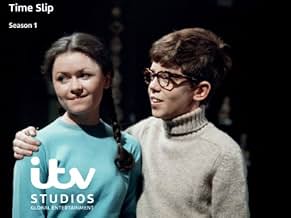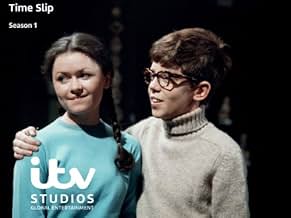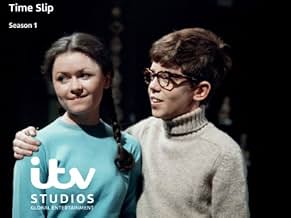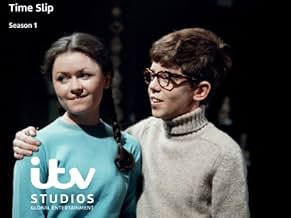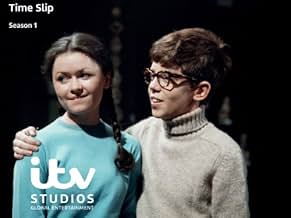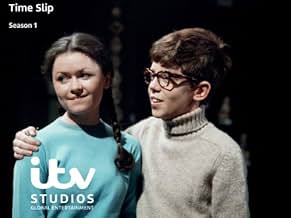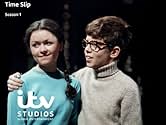Simon y Liz caen en un agujero temporal y quedan atrapados en distintas épocas del siglo XX. Durante sus aventuras se topan con el malvado Comandante Traynor, otro viajero del tiempo que les... Leer todoSimon y Liz caen en un agujero temporal y quedan atrapados en distintas épocas del siglo XX. Durante sus aventuras se topan con el malvado Comandante Traynor, otro viajero del tiempo que les complica la existencia.Simon y Liz caen en un agujero temporal y quedan atrapados en distintas épocas del siglo XX. Durante sus aventuras se topan con el malvado Comandante Traynor, otro viajero del tiempo que les complica la existencia.
Explorar episodios
Opiniones destacadas
Kids have adventures back and forth in time. The show had flaws in some ways. In spite of the fact a respectable name is credited as scientific advisor, and a legitimate Scientist Man prefaces several episodes assuring us it's all plausible and trying to explain how it might work, I never did quite get the hang of the rules, and several times it's suggested that they're in effect only hallucinating, which would lower the stakes if true but is surely contradicted by other things. The overall story arc is fairly clearly being made up as they go, and without the slickness with which some modern shows do this, and the ending breezily retcons an early part in a way that made no sense to me.
But it's very entertaining and just has a certain something about it, perhaps just the charisma of the leads, in particular the kids and Dennis Quilley as the machiavellian Traynor, and some very good scripts, and it fully deserves its enduring cult status. The parts revolving around the children encountering their future selves and not much liking how they've turned out are especially great. There are some good twists and cliffhangers, images that stay with you and much food for thought, and it gets eerily apocalyptic at one point in a way I've rarely come across. Among other highlights is a turn by CJ out of Reginald Perrin as a genuinely chilling and intimidating mad scientist that has to be seen to be believed.
But it's very entertaining and just has a certain something about it, perhaps just the charisma of the leads, in particular the kids and Dennis Quilley as the machiavellian Traynor, and some very good scripts, and it fully deserves its enduring cult status. The parts revolving around the children encountering their future selves and not much liking how they've turned out are especially great. There are some good twists and cliffhangers, images that stay with you and much food for thought, and it gets eerily apocalyptic at one point in a way I've rarely come across. Among other highlights is a turn by CJ out of Reginald Perrin as a genuinely chilling and intimidating mad scientist that has to be seen to be believed.
Mention British, science fiction and the 1970s in the same sentence and images of cardboard sets, tin foil monsters and the worst acting in the history of the business may well spring to mind. However, despite never being on a par with the slick, soap-opera style sci-fi serials from the States, the fact that homegrown sci-fi is often cheap and tatty is surely one of its appealing factors.
However, when looking at the 1970 ATV serial Timeslip, such criticisms, however quaint, are simply not applicable. Solidly acted, well crafted and smartly directed, this whopping great serial, split into 4 distinct stories, is a television treat.
First screened in 1970 and then repeated once the following year, Timeslip has maintained a loyal fan base despite its lack of exposure on television.
The series takes an intelligent look at the concept of time travel and the implications of meeting future/past selves. We travel back to a WWII naval station, forward to a Arctic research centre, the heat is turned up in a sweltering tropical jungle before closing the serial in a mixture of 60s and 70s Earth.
Epic in terms of its length and its concepts, Timselip benefits greatly from a stunning performance by Denis Quilley as Commander Traynor and a remarkably astute turn by Spencer Banks as Simon. Perhaps a drawback of the programme is the incessantly winy and extremely sexist presentation of Liz, played with little flair by Cheryl Burfield.
After a limited video release in the mid 90s, it is nice to see this wonderful series released on DVD. Although the original series was transmitted in colour, only black and white tele-recordings were maintained in the ATV archives. However, as a special treat, the final episode of The Time of the Ice Box is presented in its original colour format. Somewhat jarring after 11 episodes of grainy black and white, it makes the serial seem somewhat gaudy and bright and maybe this episode might have been best left as a special feature on the disk but all in all, it doesn't detract too much from this intelligent, well thought out serial.
However, when looking at the 1970 ATV serial Timeslip, such criticisms, however quaint, are simply not applicable. Solidly acted, well crafted and smartly directed, this whopping great serial, split into 4 distinct stories, is a television treat.
First screened in 1970 and then repeated once the following year, Timeslip has maintained a loyal fan base despite its lack of exposure on television.
The series takes an intelligent look at the concept of time travel and the implications of meeting future/past selves. We travel back to a WWII naval station, forward to a Arctic research centre, the heat is turned up in a sweltering tropical jungle before closing the serial in a mixture of 60s and 70s Earth.
Epic in terms of its length and its concepts, Timselip benefits greatly from a stunning performance by Denis Quilley as Commander Traynor and a remarkably astute turn by Spencer Banks as Simon. Perhaps a drawback of the programme is the incessantly winy and extremely sexist presentation of Liz, played with little flair by Cheryl Burfield.
After a limited video release in the mid 90s, it is nice to see this wonderful series released on DVD. Although the original series was transmitted in colour, only black and white tele-recordings were maintained in the ATV archives. However, as a special treat, the final episode of The Time of the Ice Box is presented in its original colour format. Somewhat jarring after 11 episodes of grainy black and white, it makes the serial seem somewhat gaudy and bright and maybe this episode might have been best left as a special feature on the disk but all in all, it doesn't detract too much from this intelligent, well thought out serial.
An absolutely marvellous show, and certainly not just for kids. It details the adventures of Liz and Simon, two teenage children who discover that they can pass through an invisible time barrier into past and future ages. Along the way they are involved in remarkable events, illustrating all sorts of scientific issues, and even meet past and future versions of themselves and their families.
On the surface, it had a lot of things going against it - low budget, primitive special effects and (as a result of technical problems) transmitted in black and white. These factors have probably killed its chances of being re-broadcast but its video release in 1993 allowed a new generation to appreciate it and see how it easily transcended the low production values.
Why is it so good? The biggest factor is utterly superb writing. Throughout stories were written with tremendous care, ensuring continuity. The viewer is always eager for more. The scientific themes covered such as time travel, global warming, the dangers of technology, cloning and unsafe drug experimentation are done with great accuracy - unlike a lot of science fiction - but never become dull or pontificating. The show also explores issues of authority, ambition, surveillance, elitism, betrayal and ethics - no sugar-coated kids' entertainment. Thirty years after the show was made these issues are even more relevant.
However the best quality of the writing is the dialogue, which is often tremendously funny but never risks tipping the show into comedy or making light of the drama involved. The humour is that of ordinary interaction and relationships. One reason why this is possible is the real depth of the characterisations.
Over 26 episodes there is a real opportunity to flesh out the characters. Simon is a rather geeky, bespectacled young man, obsessed with science but aware of its proper uses, and never quite sure how to deal with Liz. Liz is truly unpredictable, emotional, sometimes careless but quite feisty. She also doesn't quite know what she feels about Simon. A possible future is revealed in one story where they meet their future selves and it transpires that they were once engaged before being found to be "incompatible" by a computer test. Their future guises are tremendously entertaining - especially Liz who in one story is a cold-hearted authoritarian scientist and in another a remarkably warm, positive and charming leader of a group of outcast children.
The other characters are very well-drawn. Liz's father, Frank, is aggressive and impulsive. Her mother, Jean, is protective but much more astute. More significant is the enigmatic and often sinister figure of Commander Trainor, a government scientist who is all too eager to manipulate Liz and Simon and about whom we discover some disturbing secrets. Morgan C. Devereaux features in two stories as a brilliant but utterly unprincipled scientist who risks mayhem on those around him in his pursuit of "progress". Each story also has a range of fine ancillary characters - none better than the disturbing clones seen in "The Year Of the Burn-Up" who no have the edge on their human creators due to their devotion to "service" and "authority". Their intrigues against their supposed masters are marvellous viewing.
All the main cast give skilled acting displays - Cheryl Burfield as Liz, Spencer Banks (Simon), Derek Benfield (Frank)and Iris Russell (Jean). Particularly noteworthy are the displays of Denis Quilley as Trainor, John Barron as the odd Devereaux, Mary Preston as the future forms of Liz and David Graham as the future Simon. However it is hard to find fault with any of the guest cast as well.
The show is interesting in other ways. Liz dresses and sometimes acts well below her teenage years, even calling her parents "Mummy" and "Daddy" and wearing pig-tails. Characters regularly use the word "queer" when they mean "strange". The visions of the world in 1990 are rather more apocalyptic and much more scientifically advanced than actually happened, but the risks they point to are still present.
Anybody with an interest in thought-provoking, intelligent but witty entertainment would appreciate this show. A bit of hunting in the second-hand video stores may be the prelude to a lot of satisfied viewing...
On the surface, it had a lot of things going against it - low budget, primitive special effects and (as a result of technical problems) transmitted in black and white. These factors have probably killed its chances of being re-broadcast but its video release in 1993 allowed a new generation to appreciate it and see how it easily transcended the low production values.
Why is it so good? The biggest factor is utterly superb writing. Throughout stories were written with tremendous care, ensuring continuity. The viewer is always eager for more. The scientific themes covered such as time travel, global warming, the dangers of technology, cloning and unsafe drug experimentation are done with great accuracy - unlike a lot of science fiction - but never become dull or pontificating. The show also explores issues of authority, ambition, surveillance, elitism, betrayal and ethics - no sugar-coated kids' entertainment. Thirty years after the show was made these issues are even more relevant.
However the best quality of the writing is the dialogue, which is often tremendously funny but never risks tipping the show into comedy or making light of the drama involved. The humour is that of ordinary interaction and relationships. One reason why this is possible is the real depth of the characterisations.
Over 26 episodes there is a real opportunity to flesh out the characters. Simon is a rather geeky, bespectacled young man, obsessed with science but aware of its proper uses, and never quite sure how to deal with Liz. Liz is truly unpredictable, emotional, sometimes careless but quite feisty. She also doesn't quite know what she feels about Simon. A possible future is revealed in one story where they meet their future selves and it transpires that they were once engaged before being found to be "incompatible" by a computer test. Their future guises are tremendously entertaining - especially Liz who in one story is a cold-hearted authoritarian scientist and in another a remarkably warm, positive and charming leader of a group of outcast children.
The other characters are very well-drawn. Liz's father, Frank, is aggressive and impulsive. Her mother, Jean, is protective but much more astute. More significant is the enigmatic and often sinister figure of Commander Trainor, a government scientist who is all too eager to manipulate Liz and Simon and about whom we discover some disturbing secrets. Morgan C. Devereaux features in two stories as a brilliant but utterly unprincipled scientist who risks mayhem on those around him in his pursuit of "progress". Each story also has a range of fine ancillary characters - none better than the disturbing clones seen in "The Year Of the Burn-Up" who no have the edge on their human creators due to their devotion to "service" and "authority". Their intrigues against their supposed masters are marvellous viewing.
All the main cast give skilled acting displays - Cheryl Burfield as Liz, Spencer Banks (Simon), Derek Benfield (Frank)and Iris Russell (Jean). Particularly noteworthy are the displays of Denis Quilley as Trainor, John Barron as the odd Devereaux, Mary Preston as the future forms of Liz and David Graham as the future Simon. However it is hard to find fault with any of the guest cast as well.
The show is interesting in other ways. Liz dresses and sometimes acts well below her teenage years, even calling her parents "Mummy" and "Daddy" and wearing pig-tails. Characters regularly use the word "queer" when they mean "strange". The visions of the world in 1990 are rather more apocalyptic and much more scientifically advanced than actually happened, but the risks they point to are still present.
Anybody with an interest in thought-provoking, intelligent but witty entertainment would appreciate this show. A bit of hunting in the second-hand video stores may be the prelude to a lot of satisfied viewing...
The DVD of the entire series was released by Carlton Visual Entertainment Ltd on Monday 19th July 2004. Spread over four discs, the release features all 26 episodes including the sole surviving colour episode (not included on the original VHS release.) Both the colour episode and the black and white film recordings of the show have been totally re-mastered and cleaned up and, as such, feature much better picture resolution and sound than the poorly sourced VHS versions.
Also included in the package is an essay on the background to the show, the merchandise and brief biographies of the show's regulars together with a map of St.Oswald's and an exclusive gallery featuring never before published photos.
Also included in the package is an essay on the background to the show, the merchandise and brief biographies of the show's regulars together with a map of St.Oswald's and an exclusive gallery featuring never before published photos.
There are four TimeSlip video sets, long out of pring, and the series is currently on DVD with a colour episode (how careless that the original colour tapes have been wiped).
The special effects are quite primitive - but it's the ideas that strike a chord when you watch the stories today. The second and third stories are set in the "future" - of 1970, which is now our past. 1990 must have seemed the distant future back then - long enough for many changes to have happened.
We see ideas that do concern us today - cloning, putting faith in computers, virtual reality, and global warming. Perhaps some borrowed elements, e.g. from The Prisoner - the boy as an adult has just a number in the third story.
It should be said that the series is not by any means perfect. It is slow in places, the acting sometimes is a bit creaky, and Liz and Simon's parents don't seem to quite be old enough when another 20 years is added on. The 1970 visualisation of a 1990 computer was always unlikely to be correctly guessed, after all pocket calculators were a few years off, and home computers in any form were easily eight years away.
The first story, set in World War II, has some genuinely inspired moments, and the story as a whole is never completely finished - I think there was always a possibility of them coming back for a fifth series.
The special effects are quite primitive - but it's the ideas that strike a chord when you watch the stories today. The second and third stories are set in the "future" - of 1970, which is now our past. 1990 must have seemed the distant future back then - long enough for many changes to have happened.
We see ideas that do concern us today - cloning, putting faith in computers, virtual reality, and global warming. Perhaps some borrowed elements, e.g. from The Prisoner - the boy as an adult has just a number in the third story.
It should be said that the series is not by any means perfect. It is slow in places, the acting sometimes is a bit creaky, and Liz and Simon's parents don't seem to quite be old enough when another 20 years is added on. The 1970 visualisation of a 1990 computer was always unlikely to be correctly guessed, after all pocket calculators were a few years off, and home computers in any form were easily eight years away.
The first story, set in World War II, has some genuinely inspired moments, and the story as a whole is never completely finished - I think there was always a possibility of them coming back for a fifth series.
¿Sabías que…?
- TriviaThe regular cast were very close: Spencer Banks and Cheryl Burfield are still friends (her husband was best man at his wedding), and godparents to each other's children.
- ConexionesFeatured in WatchMojo: Top 10 Time Travel TV Shows (2016)
Selecciones populares
Inicia sesión para calificar y agrega a la lista de videos para obtener recomendaciones personalizadas
- How many seasons does Timeslip have?Con tecnología de Alexa
Detalles
Contribuir a esta página
Sugiere una edición o agrega el contenido que falta







